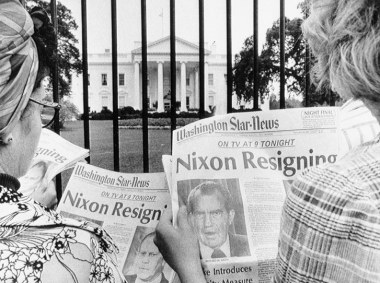Watergate is one of the most notorious political scandals of the twentieth century. Its name alone suggests collusion and scandal. In June of 1972, news surfaced that five burglars had been arrested for breaking into the Democratic National Committee (DNC) headquarters at the Watergate Complex in Washington D.C for attempts to bug the offices of top-ranking DNC officials. During the police investigation, it was revealed these men has connections to the Committee to Re-Elect the President (CRP), Richard Nixon. However, the consequences to Nixon’s political reputation and administration were not experienced until 1973, when it was revealed that the connection between the burglary and the CRP had been suppressed by senior White House staff. In response, President Nixon named Archibald Cox as special prosecutor in the Senate committee. The Senate investigation confirmed this connection between the White House and the crime, in addition to questioning other illegal activities the White House had participated in. In attempt to derail any further progress, Nixon fired Cox, the Attorney General, and Deputy Attorney General on what was known as the “Saturday Night Massacre.” Talks of impeachment by the Judiciary Committee began in 1974, and

as condition, released tapes of Nixon purposefully diverting the FBI’s attention from the crime investigation. Shortly afterwards, he resigned. The next day, Gerald Ford was sworn in as president. One of his first legal decision was granting Nixon an unconditional pardon. This decision only further damaged the public view of the government that had already been tainted by the feelings of betrayal and lack of trust brought on by the Watergate scandal.
The Nixon administration first addressed the Watergate scandal in a press conference delivered to the American people by President Nixon himself in April of 1973, nearly ten months after the incident. In his speech, he condemned the actions of the criminals, labeling their actions “senseless,” and stated that the investigation was of “deep concern to every American.” This initial rhetoric of the president depicted the incident as being of great importance to the administration and gave a sense of assurance to the American people that Nixon was following all procedures to ensure the integrity of national security is upheld. In discussing those individuals involved, Nixon announced their resignations and assumed the blame for his administration’s criminal actions against the law and national interest. “In any organization, the man at the top must bear the responsibility. That responsibility, therefore, belongs here, in this office. I accept it. And I pledge to you tonight, from this office, that I will do everything in my power to ensure that the guilty are brought
to justice and that such abuses are purged from our political processes in the years to come, long after I have left this office.” Nixon expressed a rhetoric that indicates his administration’s view on the scandal of one that was focused on bringing all criminals to justice and cleansing the White House of any employees who served as conspirators in this crime. By attempting to instill trust in the American people regarding this incident, the later revelation of Nixon’s involvement himself in the crime was increasingly difficult and full of betrayal. The man who claimed to have the country’s best interests turned out to be one of the perpetrators of corruption.
The Watergate Scandal remains a notorious controversy that affected the dynamics of American federal government in relation to the people and the trust they had for them. Nixon’s reassuring tone sharply contrasted his revealed involvement in the scandal, and led to severe consequences for the future of his political career and the attitude towards the government.
Citations:
“Nixon’s First Watergate Speech.” Watergateinfo, Watergate.info, watergate.info/1973/04/30/nixons-first-watergate-speech.html.
Oehser, Paul H., and Edward Pessen. “United States.” Encyclopædia Britannica, Encyclopædia Britannica, Inc., 10 June 2018, http://www.britannica.com/place/United-States/The-1970s#ref613277.
